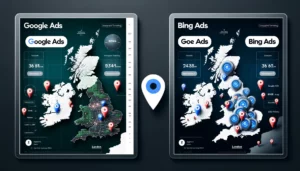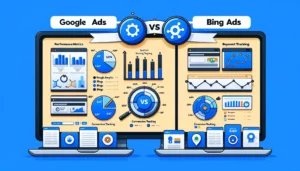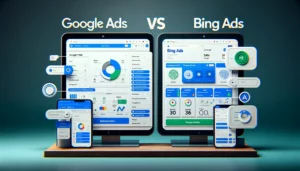Google Ads vs Bing Ads: Which is Best for Your UK Business?

When it comes to advertising your UK business online, choosing between Google Ads vs Bing Ads can be a challenging decision. Both platforms offer unique advantages and can be highly effective in reaching your target audience. This article explores the key differences, targeting options, performance metrics, ease of use, and expert opinions to help you make an informed decision.
Key Takeaways
- Google Ads offers a broader audience reach, while Bing Ads can be more cost-effective for specific demographics.
- Both platforms provide robust targeting options, including geographical, device, and audience segmentation.
- Performance metrics and reporting tools are advanced on both platforms, allowing for detailed tracking and optimisation.
- Ease of use and management tools vary, with Google Ads offering more automation features, whereas Bing Ads provides a simpler interface.
- Combining both Google Ads and Bing Ads can often yield the best results, leveraging the strengths of each platform.
Google Ads vs Bing Ads: Key Differences
Audience Reach and Demographics
When it comes to audience reach, Google Ads dominates the market with a staggering 76% market share. This extensive reach allows you to tap into a large, diverse audience, including younger users. On the other hand, Bing Ads, now known as Microsoft Ads, holds less than 5% of the market share. However, Bing’s audience tends to be older and more affluent, which can be advantageous depending on your target demographic.
Cost Per Click and Budget Considerations
One of the most significant differences between Google Ads and Bing Ads is the cost per click (CPC). Generally, Bing Ads offer a lower CPC compared to Google Ads, making it a more cost-effective option for businesses with limited budgets. Additionally, Bing Ads often have less competition, which can result in higher ad placements at a lower cost. It’s essential to consider your budget and the competitive landscape when choosing between the two platforms.
Ad Formats and Features
Both Google Ads and Bing Ads provide a variety of ad formats, including search ads, shopping ads, and app ads. However, Google Ads offers a more extensive range of features and integrations, such as advanced audience targeting and robust reporting tools. Bing Ads, while not as feature-rich, still provides essential tools and has the added benefit of integrating seamlessly with other Microsoft products. This can be particularly useful if your business relies heavily on the Microsoft ecosystem.
While Google Ads offers a broader reach and more advanced features, Bing Ads can be a cost-effective alternative with unique advantages, especially for targeting specific demographics.
Google Ads vs Bing Ads: Targeting Options for UK Businesses
Geographical Targeting
Geographical targeting allows you to focus your ads on specific locations, such as countries, cities, or even a radius around a particular point. This is particularly useful for businesses with physical locations or those targeting a specific area. For instance, a London PPC agency can use this feature to target potential clients within the city, ensuring that their ads are seen by the most relevant audience.
Device Targeting
Device targeting enables you to optimise your ads for different devices, such as desktops, tablets, or mobile phones. This is perfect for campaigns aimed at users of specific devices. For example, if your business primarily serves mobile users, you can allocate more of your budget to mobile ads, ensuring higher engagement and conversion rates.
Audience Segmentation
Audience segmentation allows you to create highly focused campaigns by targeting specific demographics, such as age, gender, and income. This precision targeting can lead to higher conversion rates, especially in B2B scenarios. Additionally, Microsoft Advertising offers LinkedIn profile targeting, which is exclusive to their platform. This feature is ideal for B2B clients, as it allows you to target according to industry, company, and job function, making your campaigns more effective.
Leveraging these targeting options can significantly enhance the effectiveness of your advertising campaigns, ensuring that your ads reach the right audience at the right time.
Google Ads vs Bing Ads: Performance Metrics and Reporting
Tracking Conversions
Tracking conversions is crucial for understanding the effectiveness of your PPC campaigns. Utilise tools like Google Analytics and Bing’s Universal Event Tracking (UET) to monitor actions such as purchases, sign-ups, and downloads. Accurate conversion tracking allows you to measure ROI and make data-driven decisions.
Analysing Click-Through Rates
Click-Through Rate (CTR) is a key performance indicator that shows how well your ads are performing. A higher CTR indicates that your ad is relevant to the audience. Regularly perform a PPC audit to identify areas for improvement. Use A/B testing to experiment with different ad copies and formats to optimise your CTR.
Budget Optimisation
Effective budget optimisation ensures that you get the most out of your advertising spend. Use automated bidding strategies and set daily or monthly budgets to control costs. Regularly review your campaign performance and adjust bids based on metrics like cost per click (CPC) and conversion rates. A well-optimised budget can significantly improve your PPC management efforts.
For UK businesses, leveraging both Google Ads and Bing Ads can provide a comprehensive view of your advertising performance, helping you to allocate your budget more effectively.
Google Ads vs Bing Ads: Ease of Use and Management Tools
User Interface Comparison
Navigating the realms of Google Ads and Bing Ads, advertisers are met with interfaces designed for ease of navigation and a suite of management tools tailored to facilitate campaign creation and optimisation. Google Ads distinguishes itself with a comprehensive array of features, presenting advertisers with intricate targeting options and an advanced analytics suite to meticulously measure campaign performance. This in-depth functionality supports advertisers in refining their strategies to align with business goals.
Automation and AI Features
Google Ads is constantly evolving, with a strong focus on automation and AI-driven features. Google’s automated bidding strategies and smart campaigns can significantly reduce the manual effort required to manage ads, making it easier for businesses to achieve their advertising goals. Bing Ads also offers automation features, but they are generally considered less advanced compared to Google’s offerings. However, Bing’s AI tools are improving, and they provide a solid foundation for businesses looking to automate their ad management processes.
Integration with Other Tools
Both platforms offer robust integration capabilities, but Google Ads has a slight edge due to its seamless integration with a wide range of tools. For instance, Google Ads easily integrates with Google Analytics, HubSpot, and various CRM systems like Salesforce and Zoho CRM. This integration simplifies campaign management and enhances ROI tracking. Bing Ads, on the other hand, integrates well with Microsoft products like MS Clarity and LinkedIn, providing unique advantages for businesses already using these tools.
For UK businesses, leveraging the integration capabilities of these platforms can lead to more efficient and effective ad management, ultimately driving better results.
Google Ads vs Bing Ads: Case Studies – Success Stories from UK Businesses
In the competitive retail sector, businesses have found significant success using both Google Ads and Bing Ads. For instance, a UK-based fashion retailer saw a 30% increase in online sales after implementing a dual-platform strategy. By leveraging the unique audience demographics of each platform, they were able to target a broader range of customers effectively.
Service-based businesses, such as local plumbing and electrical companies, have also benefited from using both advertising platforms. One notable case is a London-based plumbing service that reduced its cost per lead by 25% through strategic budget allocation between Google Ads and Bing Ads. This allowed them to maximise their reach while staying within budget.
E-commerce platforms have perhaps seen the most dramatic results. A UK-based electronics e-commerce site reported a 50% increase in conversion rates after optimising their campaigns on both platforms. They utilised advanced targeting options and tailored ad formats to engage potential customers more effectively.
Combining Google Ads and Bing Ads can offer a competitive edge, allowing businesses to tap into diverse audiences and optimise their advertising spend.
Google Ads vs Bing Ads: Expert Opinions and Recommendations
Insights from Digital Marketing Experts
Digital marketing experts often emphasise the importance of understanding your target audience. Knowing who you are targeting can significantly impact the success of your campaigns. Experts suggest leveraging both Google Ads and Bing Ads to maximise reach and effectiveness. While Google Ads offers a broader audience, Bing Ads can provide a more cost-effective solution with less competition.
Common Pitfalls to Avoid
One common pitfall is neglecting to monitor and adjust your campaigns regularly. It’s crucial to keep an eye on performance metrics and make necessary adjustments to optimise results. Another mistake is not utilising the full range of features available on both platforms. For instance, Bing Ads offers unique features like LinkedIn profile targeting, which can be highly beneficial for B2B businesses.
Best Practices for Maximising ROI
To maximise ROI, consider the following best practices:
- Conduct thorough keyword research to identify high-performing keywords.
- Utilise ad extensions to enhance the visibility and effectiveness of your ads.
- Regularly A/B test your ad creatives to determine what resonates best with your audience.
- Leverage automation and AI features to streamline campaign management and improve efficiency.
- Monitor your budget closely and allocate funds to the best-performing campaigns.
Combining insights from experts with a strategic approach can lead to significant improvements in your advertising efforts. By avoiding common pitfalls and following best practices, you can achieve optimal results and maximise your return on investment.
Combining Google Ads and Bing Ads for Optimal Results
Benefits of a Dual-Platform Strategy
Combining Google Ads and Bing Ads can significantly enhance your PPC strategy. While Google Ads may be top-of-mind, Bing Ads can complement your efforts by filling gaps in your online presence. By leveraging both platforms, you can increase the visibility of your ads and reach a broader audience. Bing Ads often have higher positioning, less bidding competition, and generally a lower cost-per-click, making it a valuable addition to your Google Ads PPC campaigns.
Budget Allocation Tips
When allocating your budget, it’s essential to consider the strengths of each platform. Google Ads typically have a higher search volume, making it ideal for reaching a wider audience. On the other hand, Bing Ads can be more cost-effective, especially for niche markets. A balanced approach might involve allocating a larger portion of your budget to Google Ads while reserving a smaller, yet significant, amount for Bing Ads to capture unique opportunities.
Measuring Combined Performance
To measure the combined performance of your Google Ads and Bing Ads campaigns, you should track key performance metrics such as click-through rates (CTR), conversion rates, and return on investment (ROI). Using tools like Google Analytics and Bing’s reporting features can help you gain insights into how each platform contributes to your overall marketing goals. Regularly conducting a Google Ads audit and comparing it with Bing’s performance can help you optimise your strategy for better results.
A dual-platform strategy allows you to benefit from the cumulative effect of both ad platforms, maximising your reach and effectiveness.
By working with a PPC agency or Google advertising agency, you can ensure that your campaigns are well-managed and optimised for the best possible outcomes. Whether you’re a PPC eCommerce agency or a business looking to improve your eCommerce PPC, combining Google Ads and Bing Ads can provide a comprehensive approach to digital advertising.
Conclusion
In the debate of Google Ads vs. Bing Ads, there is no one-size-fits-all answer. Each platform offers unique advantages that can cater to different business needs and advertising goals. Google Ads provides an extensive reach and a broad audience, making it ideal for businesses looking to maximise visibility. On the other hand, Bing Ads offers a more cost-effective solution with a specific audience, which can be particularly beneficial for businesses with a tighter budget or niche market. Ultimately, the best approach may be to leverage both platforms, testing and optimising your campaigns to see which combination yields the best results for your UK business. By understanding the strengths and limitations of each, you can make an informed decision that aligns with your marketing objectives and budget constraints.
Frequently Asked Questions
What are the main differences between Google Ads and Bing Ads?
Google Ads has a larger audience reach and more extensive features, while Bing Ads can be more cost-effective and offer better targeting for specific demographics.
Which platform is more cost-effective for small businesses?
Bing Ads generally have a lower cost per click (CPC) compared to Google Ads, making it a more budget-friendly option for small businesses.
Can I use both Google Ads and Bing Ads simultaneously?
Yes, many businesses use both platforms to maximise their reach and take advantage of the unique benefits each offers.
How do the targeting options differ between Google Ads and Bing Ads?
Both platforms offer robust targeting options, including geographical, device, and audience segmentation. However, the specifics and effectiveness can vary depending on your target audience.
What kind of businesses benefit most from using Bing Ads?
Businesses with a specific target audience or those looking for a more cost-effective advertising solution may find Bing Ads particularly beneficial.
Is the user interface of Bing Ads easier to use than Google Ads?
The ease of use can be subjective and depends on individual preferences. However, some users find Bing Ads to be more straightforward and easier to navigate.
Author
Search Blog
Free PPC Audit
Subscribe to our Newsletter
The Voices of Our Success: Your Words, Our Pride
Don't just take our word for it. With over 100+ five-star reviews, we let our work-and our satisfied clients-speak for us.
"We have been working with PPC Geeks for around 6 months and have found Mark and the team to be very impressive. Having worked with a few companies in this and similar sectors, I rate PPC Geeks as the strongest I have come across. They have taken time to understand our business, our market and competitors and supported us to devise a strategy to generate business. I value the expertise Mark and his team provide and trust them to make the best recommendations for the long-term."
~ Just Go, Alasdair Anderson




